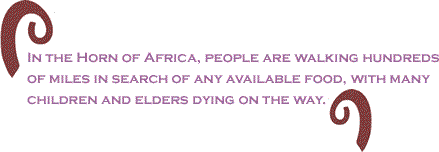| We’ve
heard it said before, “Yes, I know people in poor countries
have a lot of needs. But so do many people in this country,
and we should take care of them first.” The speakers are
rarely people who are unconcerned about poverty and hunger.
On the contrary, they are paying attention - and reacting
- to the needs they see around them and the more general
problems facing Americans. However, they fail to acknowledge
that problems overseas also impact us in the United States.
Any particular economic event - say, sharply rising food
prices - has very different consequences for people in the
United States than it does for people in developing countries.
In this country, people may lose their jobs, lose their
homes, have to move in with relatives, struggle to put food
- especially healthy food - on the table, and face many
other hardships. But in the Horn of Africa, people are walking
hundreds of miles in search of any available food, with
many children and elders dying on the way. Drought and conflict
have already killed tens of thousands from southern Somalia
alone, while more than 12 million people in the region are
at risk.
Outside of the Horn of Africa, even in non-emergency areas,
the human toll from hunger, poverty, and lack of access
to basic health care is enormous in developing countries.
Poor families spend up to 80 percent of their entire incomes
on food. So they can’t cope with rising food prices by buying
only what’s on sale or eating frozen vegetables instead
of fresh. Instead, people simply eat less, period. They
reduce portion sizes, eat just a staple grain and nothing
else, or skip meals altogether. Children younger than 2
suffer irreversible effects from malnutrition, and both
they and their slightly older siblings, up to age 5, are
at far greater risk of death than healthy children - whether
from starvation, or from diseases such as measles that are
often fatal in malnourished children.
The most immediate needs in the Horn of Africa include improving
food access and solving urgent health and nutrition problems.
Emergency aid is vital right now, but we must also think
beyond the current crisis. It is much more cost-effective
- in terms of both dollars and human suffering - to invest
in building agriculture systems that are sustainable in
the long run. The tragedy in Somalia was compounded by a
failure to target scarce resources to programs that help
families build resilience to disasters such as drought.

The Horn of Africa crisis could have been much worse without
programs such as Ethiopia’s Productive Safety Net Program,
which helps small farmers diversify their crops, broaden
their income sources, create local markets, better manage
their water resources, and increase the nutritional content
of their families’ diets. Such “country-led” programs were
models for Feed the Future, the U.S. government’s global
program to promote sustainable agriculture, food security,
and nutrition. This approach makes the argument that it
is preferable to invest a few dollars per person per year
to help people become more food secure and resilient in
the face of disaster, than to invest hundreds of dollars
per person to deliver emergency relief that only lasts three
to four months.
Unfortunately, U.S. funding for both longer-term agriculture
and nutrition programs and
emergency food aid is at risk. Ironically, U.S.
foreign aid accounts for less than 1 percent of the budget.
Balancing the federal budget will take more than cuts to
programs like these.
The Bible tells us to uplift - not demoralize - the “least
of these.” We are incredulous that some of our nation’s
leaders, including people from the “Bible Belt,” are taking
positions on the federal budget without understanding how
their decisions impact vulnerable people. We
urge our lawmakers to focus instead on protecting assistance
programs for hungry and poor people around the world.
For
more on the Horn of Africa crisis, visit www.bread.org/hunger/global/eastern-africa-drought/
or www.saveafricaschildren.org.

BlackCommentator.com Guest Commentators Rev. Derrick Boykin serves as associate
for African American leadership outreach at Bread for the
World. Bishop Charles E. Blake, founder and CEO of Save
Africa's Children, is the presiding bishop of the 6.5 million
member Church of God in Christ. Click here
to contact Rev. Boykin and Bishop Blake.
|

